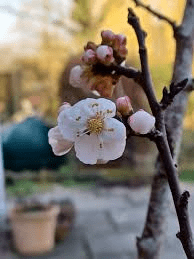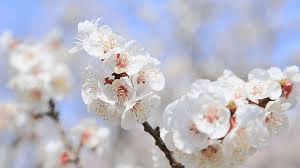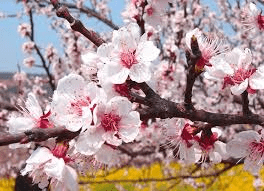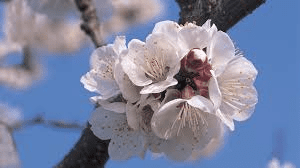Apricot flowers, the blossoms of the apricot tree (Prunus armeniaca), are a beautiful and essential part of the tree’s reproductive process. These flowers typically bloom in early spring, often before the leaves fully develop, creating a stunning display of delicate pink or white petals that contrast against the tree’s bare branches. The apricot flowers are not only visually appealing but also play a crucial role in the production of apricot fruits.
Structurally, apricot flowers are composed of several parts. Each flower has five petals that are usually round or slightly oval. The center of the flower contains the reproductive organs, including multiple stamens (the male parts) that produce pollen, and a single pistil (the female part) that contains the ovary. The stigma, located at the tip of the pistil, is where pollination occurs. Surrounding the reproductive organs are the sepals, small green structures that protect the flower bud before it opens.
Pollination is a critical process for apricot flowers. Insects, primarily bees, visit the flowers to collect nectar and pollen. As they move from flower to flower, they transfer pollen from the stamens of one flower to the stigma of another, facilitating cross-pollination. This transfer of pollen allows fertilization to occur, leading to the development of seeds within the ovary. The fertilized ovary then grows into the apricot fruit, enclosing the seed within a hard pit.
Apricot flowers are sensitive to environmental conditions, particularly temperature. Late spring frosts can be detrimental, as they can damage the blossoms and reduce fruit set. Therefore, apricot trees are often planted in areas with mild climates or protected from extreme temperature fluctuations to ensure successful flowering and fruit production.
Beyond their role in fruit production, apricot flowers have cultural and symbolic significance in various regions. In some cultures, the blooming of apricot flowers is celebrated as a herald of spring and new beginnings. The delicate beauty of the flowers is often associated with themes of purity and renewal. In art and literature, apricot blossoms are frequently depicted to convey these symbolic meanings.
From a horticultural perspective, the health of apricot flowers is vital for a successful harvest. Ensuring that the tree receives adequate nutrients, water, and sunlight can promote healthy blooming. Additionally, proper pruning and pest management practices can help protect the flowers from diseases and insect damage. Common issues that can affect apricot flowers include fungal infections such as blossom blight and pest infestations by insects like aphids and spider mites.
Aapricot flowers are not only an aesthetically pleasing aspect of the apricot tree but also play a fundamental role in the tree’s reproductive cycle. Their successful pollination and subsequent fruit development are essential for apricot production. Ensuring the health and protection of these delicate flowers through proper horticultural practices can lead to a bountiful harvest and contribute to the tree’s overall vitality and beauty.
The Economic Importance and Uses of Apricot Flowers

1. Pollination: Apricot flowers attract bees and other pollinators, which are essential for the production of apricot fruits and the pollination of other crops.
2. Culinary Uses: Apricot flowers can be used in culinary applications, such as garnishing dishes, making floral teas, and creating syrups and jellies.
3. Perfume Industry: The delicate fragrance of apricot flowers is used in the perfume industry to create floral scents for perfumes and scented products.
4. Cosmetic Industry: Extracts from apricot flowers are used in skincare products for their soothing and anti-inflammatory properties, helping to improve skin health.
5. Herbal Medicine: Apricot flowers are used in traditional herbal medicine to treat various ailments, including respiratory issues and digestive problems.
6. Ornamental Value: Apricot flowers are highly valued for their aesthetic appeal and are used in landscaping and gardening to enhance visual beauty.
7. Essential Oils: Essential oils extracted from apricot flowers are used in aromatherapy and for creating natural fragrances.
8. Dye Production: The pigments in apricot flowers can be used to produce natural dyes for fabrics and other materials.
9. Nutraceuticals: Compounds found in apricot flowers are used in nutraceutical products for their potential health benefits, including antioxidant and anti-inflammatory effects.
10. Honey Production: Bees that pollinate apricot flowers produce apricot blossom honey, which is valued for its unique flavor and health benefits.
11. Cultural Significance: In some cultures, apricot flowers hold cultural and symbolic significance, often used in festivals and traditional ceremonies.
12. Tea Production: Dried apricot flowers are used to make floral teas that are believed to have various health benefits, including calming and digestive properties.
13. Potpourri: Apricot flowers are used in potpourri mixtures for their pleasant fragrance, contributing to home décor and air freshening.
14. Skincare Masks: Apricot flower extracts are used in homemade and commercial skincare masks for their beneficial effects on the skin.
15. Wedding Decorations: Apricot flowers are popular in wedding decorations, bouquets, and centerpieces due to their beauty and fragrance.
16. Educational Purposes: Apricot flowers are used in educational settings to teach botany and horticulture, helping students understand plant biology and reproduction.
17. Livelihood: Harvesting and selling apricot flowers can provide income for local communities, supporting economic development.
18. Landscape Restoration: Apricot trees, with their beautiful flowers, are used in landscape restoration projects to improve ecological balance and enhance biodiversity.
Read Also: Rice Tungro Disease: Description, Damages Caused, Control and Preventive Measures
The Products and By-products That Can Be Derived From Apricot Flowers

1. Floral Teas: Dried apricot flowers are used to make floral teas, known for their calming and digestive properties. The flowers are steeped in hot water to extract their flavors and benefits.
2. Perfume: The delicate fragrance of apricot flowers is extracted and used in the perfume industry to create floral scents for perfumes and scented products.
3. Skincare Products: Apricot flower extracts are included in lotions, creams, and serums for their soothing and anti-inflammatory properties, improving skin health.
4. Syrups and Jellies: Apricot flowers are used to make syrups and jellies, adding a unique floral flavor to these culinary products.
5. Essential Oils: Essential oils extracted from apricot flowers are used in aromatherapy and natural fragrances. The extraction process involves steam distillation.
6. Natural Dyes: The pigments in apricot flowers are extracted to produce natural dyes for fabrics and other materials, creating eco-friendly colorants.
7. Herbal Remedies: Apricot flowers are used in traditional herbal medicine to create remedies for respiratory and digestive issues. The flowers are dried and used in various preparations.
8. Potpourri: Apricot flowers are dried and mixed with other aromatic plants to create potpourri, used for home décor and air freshening.
9. Honey: Bees that pollinate apricot flowers produce apricot blossom honey, valued for its unique flavor and health benefits. The honey is collected and processed for consumption.
10. Floral Garnishes: Fresh apricot flowers are used as garnishes in culinary dishes, adding visual appeal and a subtle floral flavor.
11. Wedding Bouquets: Apricot flowers are popular in wedding bouquets and decorations due to their beauty and fragrance. They are arranged with other flowers to create stunning floral displays.
12. Nutraceutical Supplements: Compounds found in apricot flowers are used in nutraceutical products for their potential health benefits, including antioxidant and anti-inflammatory effects.
13. Aromatherapy: Essential oils from apricot flowers are used in aromatherapy to promote relaxation and reduce stress. The oils are diffused or applied topically.
14. Facial Masks: Apricot flower extracts are used in homemade and commercial facial masks for their beneficial effects on the skin, including soothing and hydration.
15. Culinary Decorations: Apricot flowers are used to decorate cakes, pastries, and other desserts, adding an elegant touch to culinary creations.
16. Cultural Artifacts: In some cultures, apricot flowers are used in the creation of cultural artifacts and decorations, celebrating their symbolic significance.
17. Educational Tools: Apricot flowers are used in educational settings to teach students about plant biology, reproduction, and horticulture, enhancing their understanding of botany.
Read Also: 17 Medicinal Health Benefits Of Strobilanthes callosa (Neelakurinji)
Frequently Asked Questions (FAQ’s) About Apricot Flowers

1. What are the culinary uses of apricot flowers?
Apricot flowers can be used as garnishes, in floral teas, and to make syrups and jellies. They add a unique floral flavor and visual appeal to dishes and beverages.
2. Can apricot flowers be used in skincare products?
Yes, extracts from apricot flowers are used in skincare products for their soothing and anti-inflammatory properties. They help improve skin health and reduce irritation.
3. How are apricot flowers used in the perfume industry?
The delicate fragrance of apricot flowers is extracted and used to create floral scents for perfumes and scented products, providing a natural and pleasant aroma.
4. Are apricot flowers used in traditional medicine?
Yes, apricot flowers are used in traditional herbal medicine to treat respiratory and digestive issues. They are dried and used in various herbal preparations.
5. What is apricot blossom honey?
Apricot blossom honey is produced by bees that pollinate apricot flowers. It has a unique flavor and is valued for its health benefits, including antioxidant and antibacterial properties.
6. Can apricot flowers be used to make natural dyes?
Yes, the pigments in apricot flowers can be extracted to produce natural dyes for fabrics and other materials. These dyes are eco-friendly and non-toxic.
7. How are apricot flowers used in wedding decorations?
Apricot flowers are popular in wedding bouquets, centerpieces, and other decorations due to their beauty and fragrance. They add an elegant and romantic touch to wedding decor.
8. What are the benefits of apricot flower teas?
Apricot flower teas are known for their calming and digestive properties. Drinking these teas can help reduce stress, improve digestion, and promote relaxation.
9. How are essential oils extracted from apricot flowers?
Essential oils are extracted from apricot flowers through steam distillation. The volatile compounds are captured and used in aromatherapy and natural fragrances.
10. What role do apricot flowers play in pollination?
Apricot flowers attract bees and other pollinators, which are essential for the production of apricot fruits and the pollination of other crops. This process helps ensure a healthy and productive ecosystem.

